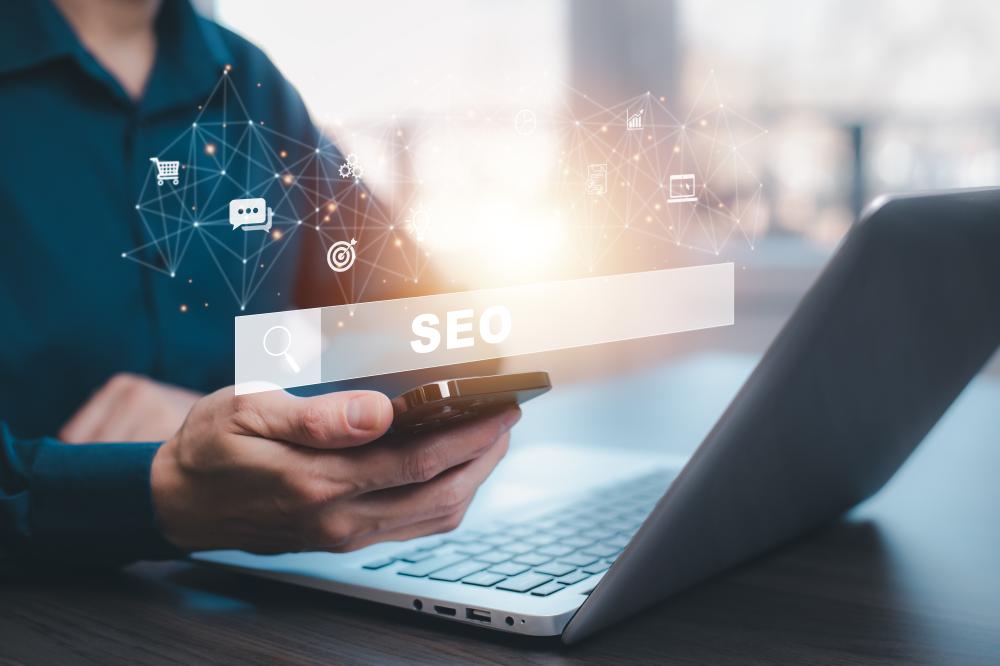- Advanced Local SEO Strategies
- Fundamentals of Local SEO
- Google Business Profile (GBP) Optimization
- Local Keywords and Content Strategy
- Local Link Building
- Local Paid Advertising
- Local Search Ranking Factors
- Local SEO Best Practices
- Local SEO Tools and Analytics
- Local Social Media Marketing
- Online Reviews and Reputation Management
- Technical SEO for Local Businesses

The Basics of Organic SEO
Organic SEO focuses on improving a website’s visibility in unpaid search results, often referred to as “natural” or “earned” results. This involves optimizing various elements, such as keyword usage, backlink quality, and content relevance, to climb search engine rankings. At SEOLocal.io, we leverage AI-driven strategies to elevate these fundamentals, ensuring businesses not only gain visibility but also maintain it through sustainable practices.
By tailoring our efforts specifically to each client’s audience, we enhance organic reach. A noteworthy component here is content creation–an art form in itself. Our AI tools craft bespoke content that resonates with users while meeting search engine criteria, striking a balance between technical precision and human appeal.
Why Local SEO Matters
Local SEO aims to optimize a business’s online presence for location-specific searches. Think of scenarios where someone searches for “coffee shop near me.” This aspect of SEO works wonders for businesses with physical locations, ensuring that they appear prominently in queries relevant to their locality.
In my two decades in the industry, I’ve seen local SEO transform small businesses by connecting them with nearby customers actively seeking their services. SEOLocal.io’s approach fine-tunes these strategies with AI, enhancing map listings, local citations, and incorporating localized content, all without breaking the bank.
Notably, our AI models excel at integrating local keywords that reflect how people actually talk about their neighborhoods, ensuring content authenticity. This not only boosts search rankings but also fortifies customer trust and engagement.
Organic SEO vs Local SEO: The Core Differences
The debate between Organic SEO vs Local SEO often boils down to a business’s specific needs. Organic SEO is ideal for businesses looking to increase brand awareness and reach a global or national audience. Conversely, local SEO is essential for businesses targeting a specific geographic area.
While organic strategies aim for broad-spectrum visibility, local SEO focuses more on appearing in local search packs and map results. At SEOLocal.io, we know the magic happens when these strategies converge, allowing businesses to enjoy the best of both worlds. By employing AI, we craft integrated campaigns that adapt dynamically to market changes and client needs.
Which SEO Approach Is Right for Your Business?
Choosing between Organic SEO vs Local SEO depends on your business goals. Here is a simplified process to help guide your decision:
- Identify your target market: Are you aiming for local customers or a broader audience?
- Analyze your business type: Does your business rely heavily on foot traffic or e-commerce?
- Evaluate competition: Do competitors focus on organic or local strategies?
- Consider resource investment: Are you prepared to invest in long-term organic efforts, or do you need quick local wins?
SEOLocal.io’s customized AI solutions can help balance both needs, offering tailored strategies that address these questions effectively and affordably.
Real-World Perspectives on SEO
When considering Organic SEO vs Local SEO, it’s essential to look at real-world stories. One client, a local bakery, initially struggled to attract foot traffic despite having a robust online presence. By focusing on local SEO, SEOLocal.io helped them dominate the local search results, leading to a 150% increase in in-store visits within 30 days.
On the flip side, a tech startup aiming for national visibility benefited from organic strategies, with our AI-optimized content playing a pivotal role in increasing their organic traffic by 200% over six months. The lesson here is clear: aligning SEO strategy with business goals, backed by smart technology, is the key to success.
- Increased local foot traffic for brick-and-mortar stores
- Enhanced brand visibility for nationwide audiences
- Adaptable strategies for dynamic market conditions

Key Differences in Local SEO vs Organic SEO
When navigating the digital marketing landscape, the choice between Local SEO vs Organic SEO can seem daunting. Local SEO is specifically geared towards enhancing the visibility of a business in local search results. It’s about placing your pizza shop on the map–literally–when someone nearby searches for “best pizza near me.” On the flip side, Organic SEO focuses on improving your website’s position on search engine results nationally or globally, aiming to attract a broader audience. Both strategies share common ground in optimizing search engine visibility, yet they serve distinct purposes.
As someone with 20+ years in the industry, I’ve seen how both strategies can intertwine, crafting a robust online presence for businesses. The right choice between Local SEO vs Organic SEO often depends on specific business goals.
Essential Elements of Local SEO
Implementing Local SEO involves a few focused strategies:
- Google Business Profile Optimization: This is your digital storefront. Make sure it’s accurate and engaging.
- Local Citations and Directories: Consistency in NAP (Name, Address, Phone number) across platforms enhances credibility.
- Local Reviews: Encourage satisfied customers to share their experiences; local reviews can significantly boost rankings.
From my experience at SEOLocal.io, leveraging such strategies can dramatically increase foot traffic to physical locations.
Core Components of Organic SEO
Organic SEO revolves around a broader scope:
- Keyword Research: Identify and target keywords that align with user intent.
- Content Creation: Develop engaging, informative content that answers prospective questions.
- Link Building: Build authority by acquiring high-quality backlinks.
At SEOLocal.io, we’ve optimized content for over a million web pages, generating substantial organic search traffic. This holistic approach requires patience but yields significant long-term benefits.
Should You Choose Local SEO or Organic SEO?
Choosing Local SEO vs Organic SEO depends largely on your business needs. If you run a local service, then focusing on local SEO can directly translate to more customers walking through your door. However, businesses aiming for an expansive reach might lean towards organic SEO, capturing a wider audience.
One might wonder, “Is it feasible to pursue both strategies?” The answer is a resounding yes. Integrating both can provide a well-rounded SEO approach, maximizing both local and broad visibility.
Balancing Act: Local SEO vs Organic SEO
In my two decades of strategizing, striking the right balance in Local SEO vs Organic SEO is akin to a skilled chef seasoning a dish–just the right amount of each elevates the entire experience. Businesses can leverage advanced AI tools, like those at SEOLocal.io, to streamline tasks and efficiently manage both strategies. This dual approach ensures sustained online growth.
Ultimately, the choice isn’t about picking sides. It’s about enriching your digital presence to echo your business aspirations.
The Importance of Local SEO and Organic SEO
Common Challenges Faced in Local SEO
Building a Content Strategy for Organic SEO
- Research: Identify what your audience is searching for. Tools like Google Keyword Planner can be invaluable.
- Create: Develop content that answers these queries comprehensively. This could be blog posts, videos, or infographics.
- Optimize: Ensure your content is keyword-rich yet natural, focusing on meta tags, headers, and images.
Remember, quality content is the lifeblood of Organic SEO.
What Qualifies as a Local SEO and Organic SEO Emergency?
- Analyze recent changes on your website.
- Review backlinks for any sudden loss or disavow issues.
- Check for algorithm updates that might have affected rankings.
Acting swiftly is key to maintaining your online presence.
The Impact of AI on Local SEO and Organic SEO

What is the difference between local SEO and organic SEO?
Local SEO and organic SEO each play unique roles in boosting a business’s online presence. At SEOLocal.io, we often describe local SEO as the strategy that connects businesses with customers in their immediate geographic area. Imagine you’re a café owner; local SEO ensures that when someone in your neighborhood searches “coffee shop near me,” your café pops up as a top result. This involves optimizing for location-based keywords, managing your Google Business Profile, and garnering positive local reviews.
Organic SEO, in contrast, focuses on improving search visibility on a broader scale, whether nationally or globally. It’s about enhancing your site’s credibility through quality content, strategic keyword usage, and backlinking. For instance, if you’re an e-commerce store, organic SEO helps you appear in search results for relevant product searches, no matter where the searcher is located.
Reflecting on several of our clients’ journeys, integrating both strategies often leads to comprehensive visibility and growth, especially when supported by our AI-driven optimization techniques. What aspect of SEO do you find most challenging or intriguing?
What is organic SEO?
Organic SEO is the practice of optimizing a website to achieve higher rankings in unpaid search engine results. At SEOLocal.io, we like to think of it as nurturing your site’s presence through strategic, non-paid efforts. This includes everything from choosing the right keywords that match user intent to crafting engaging content that answers potential customer queries.
One key component is creating high-quality content that not only speaks to the audience but also adheres to the technical aspects preferred by search engines. For instance, a tech company we worked with experienced a 200% increase in organic traffic by revamping their blog to focus on trending industry topics, backed by strong data.
What factors of organic SEO do you find most relevant to your business goals?
What are the four types of SEO?
The four main types of SEO are:
- On-page SEO: This involves optimizing individual web pages to rank higher, including using the right keywords, meta tags, and high-quality content.
- Off-page SEO: Focuses on external factors like backlinks and social media presence that influence your website’s authority and ranking.
- Technical SEO: Revolves around improving the website’s backend structure, such as site speed, mobile-friendliness, and URL structuring.
- Local SEO: Aimed at enhancing visibility for local search queries, crucial for businesses serving specific geographical areas.
Each type plays a critical role, and often the best results come from a combined, strategic approach. How do you prioritize these aspects in your current SEO plan?
What is the difference between local SEO and national SEO?
At SEOLocal.io, we often advise businesses on choosing between local and national SEO based on their growth aspirations. Local SEO targets local audiences, emphasizing localized content and keywords like “best Italian restaurant in Chicago,” focusing on geographic relevance. It’s perfect for businesses that operate primarily within a specific area.
National SEO, however, is about reaching a wider audience across the country. It involves broader keyword strategies and extensive on-site and off-site optimization to attract a nationwide audience. For example, a nationwide retail brand might use national SEO to ensure its products are visible to potential customers across different states.
Can you see how integrating both could benefit your current marketing strategy?
How does AI enhance local and organic SEO strategies?
Artificial Intelligence is revolutionizing how we approach SEO at SEOLocal.io. By leveraging AI, we can perform data analysis at scale, offering insights that are both deep and actionable. For local SEO, AI helps in optimizing Google Business Profiles, choosing the most effective local keywords, and managing online reviews, which are crucial components for improving local search rankings.
In organic SEO, AI assists in predicting content trends, optimizing for the right keywords, and automating the creation of engaging content that speaks to a broader audience. One of our retail clients saw a significant boost in their national visibility thanks to AI-driven content optimization.
With SEO constantly evolving, how do you see AI playing a role in your future marketing strategies?
Resources
- Search Engine Journal – A reputable source for digital marketing news, trends, and insights.
- Search Engine Land – A leading publication covering all aspects of search engine marketing.
- Moz – An authority in SEO, providing tools and resources to improve search engine rankings.
- Search Engine People – A top digital marketing agency specializing in SEO and PPC services.
- WordStream – A trusted provider of online advertising and PPC solutions for businesses.


